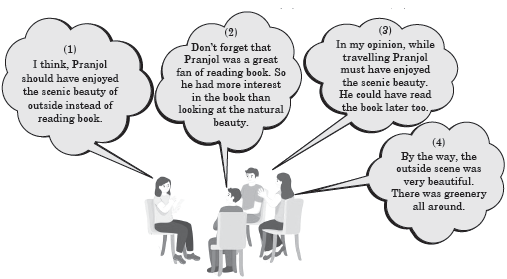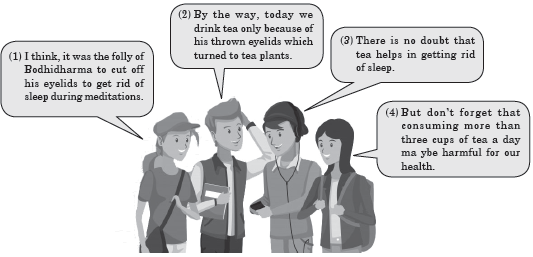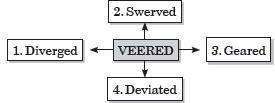Please refer to Glimpses of India MCQ Questions Class 10 English below. These MCQ questions for Class 10 English with answers have been designed as per the latest NCERT, CBSE books, and syllabus issued for the current academic year. These objective questions for Glimpses of India will help you to prepare for the exams and get more marks.
Glimpses of India MCQ Questions Class 10 English
Please see solved MCQ Questions for Glimpses of India in Class 10 English. All questions and answers have been prepared by expert faculty of standard 10 based on the latest examination guidelines.
MCQ Questions Class 10 English Glimpses of India
Question. When the writer says, ‘Baking was indeed a profitable profession in the old days.’, he means
that:
A) baking isn’t as popular in Goa currently
B) bakers have chosen to adopt other professions
C) baking, as a job, isn’t as gainful as it used to be
D) bakers’ goods were of a better quality in earlier times
Answer
C
Question. The kabai was a ‘peculiar’ outfit as it was:
A) a tight-fitting apparel
B) too colourful
C) made of unsuitable materials
D) a dress-like attire
Answer
D
Question. What is Assam popularly known as?
A) Tea country
B) Coffee country
C) Green country
D) Plantation country
Answer
A
Question. What is the duration of the second flush or sprouting period?
A) June.August
B) October.December
C) May.July
D) August.November
Answer
C
Question. Who is the author of “Tea from Assam”?
A) Arup Kumar Datta
B) Lokesh Abrol
C) Lucio Rodrigues
D) None of the Above
Answer
A
Question. _____ river obtains its water from Coorg.
A) Yamuna
B) Narmada
C) Kaveri
D) Tapi
Answer
C
Question. Who is the author of “Coorg”?
A) Arup Kumar Datta
B) Lokesh Abrol
C) Lucio Rodrigues
D) None of the Above
Answer
B
Question. Coorg is a _________country.
A) tea
B) bread
C) coffee
D) green
Answer
C
Question. What are the bakers known as in Goa?
A) Pader
B) Portugese
C) pekar
D) Baker
Answer
A
Question. How many times did the baker come everyday?
A) Once
B) Twice
C) Thrice
D) varies daily
Answer
B
Question. The first chief of the Indian Army is from _____.
A) coorg
B) Goa
C) Mysore
D) Punjab
Answer
A
Question. “You seem to have done your homework before coming,” Pranjol’s father said in surprise. Which homework is he talking about?
A) Holiday homework
B) Tuition homework
C) Knowledge about Assam
D) All of the Above
Answer
C
Question. What is canoeing?
A) travelling in a river in a canoe
B) travelling in a river in a raft
C) going down a cliff by sliding down a rope
D) All of the above
Answer
A
Question. “Almost everyone in the compartment was drinking _____ too”
A) Coffee
B) Juice
C) Tea
D) Water
Answer
C
Question. What was Dhekiabari?
A) Name of a station
B) Tea garden managed by Pranjol’s father
C) Tea garden managed by Rajvir’s father
D) Name of a hill
Answer
B
Question. The words like ‘chai’ and ‘chini’ are derived from ___________.
A) India
B) China
C) France
D) None of these
Answer
B
Question. In Europe, tea was drunk as more of a ___________ than ___________.
A) medicine, beverage
B) beverage, medicine
C) sleep waver, medicine
D) sleep banisher, medicine
Answer
A
Question. Where did Rajvir and Pranjol study?
A) Assam
B) Karnataka
C) Goa
D) Delhi
Answer
D
Question. What is Assam popularly known as?
A) Tea country
B) Coffee country
C) Green country
D) Plantation country
Answer
A
Extract Based Questions :
1. Read the given extracts to attempt the questions that follow:
“Tell me another!” scoffed Pranjol. “We have an Indian legend too. Bodhidharma, an ancient Buddhist ascetic, cut off his eyelids because he felt sleepy during meditations. Ten tea plants grew out of the eyelids. The leaves of these plants when put in hot water and drunk, banished sleep.” “Tea was first drunk in China,’’ Rajvir added, ‘‘as far back as 2700 B.C.! In fact, words such as tea, chai and chini are from the Chinese. Tea came to Europe only in the sixteenth century and was drunk more as medicine than as beverage.”
Question. Based on the inference from the extract, which of these is NOT TRUE about tea drinking in the sixteenth century Europe?
Dr Smith is a doctor of sixteenth century Europe.
A) Dr. Smith encouraged drinking of green tea whenever available, to reduce chances of tooth loss.
B) Dr Smith prescribed regular tea drinking to all his patients with a weak heart.
C) Dr Smith always served tea as refreshment when he has guests, as they all enjoyed this beverage.
D) Dr Smith usually recommended black tea to reduce inflammation in the body.
Answer
C
Question. The main idea of this extract is:
A) Tea as a popular beverage in Europe and how it spread.
B) Origin of tea in India and why it became popular in Europe.
C) Importance of India in popularising tea and influencing Europe.
D) Indian legend on tea and how it travelled from China to Europe.
Answer
D
Question. Pick the option that includes the tea label information that corresponds to the given sentence.
“The leaves of these plants when put in hot water and drunk, banished sleep.”
1. Its calming effects may be attributed to an antioxidant called apigenin, which is found in abundance in chamomile tea. Apigenin binds to specific receptors in your brain that may decrease anxiety and initiate sleep.
2. It increases levels of a neurotransmitter called gamma-aminobutyric acid (GABA) and improves overall sleep quality by shortening the time it takes to fall asleep and decreasing night time awakenings.
3. It interferes with REM sleep, has some unwanted side effects, keeps sleep away and allows the possibility of inducing hours of sleeplessness and increased night-time awakenings.
4. It alleviates anxious thoughts and soothes the spirit before bedtime. It improves energy levels and helps banish stress and results in better night’s sleep, naturally.
A) Option 1
B) Option 2
C) Option 3
D) Option 4
Answer
C
Question. Why do you think Pranjol ‘scoffed’?
A) He was upset with the legend Rajvir shared.
B) He was mocking Rajvir for his lack of knowledge.
C) He was amused and tickled at what Rajvir shared.
D) He was impressed with what Rajvir had shared.
Answer
C
Question. Based on this extract, how do you think Rajvir felt while narrating?
A) (1) excited (2) agitated
B) (1) hysterical (2) nervous
C) (1) nervous (2) agitated
D) (1) enthusiastic (2) passionate
Answer
D
2. Read the given extracts to attempt the questions that follow:
The train pulled out of the station. Pranjol buried his nose in his detective book again. Rajvir too was an ardent fan of detective stories, but at the moment he was keener on looking at the beautiful scenery. It was green, green everywhere. Rajvir had never seen so much green of before. Then the soft green paddy fields gave way to tea bushes.
It was a magnificent view. Against the backdrop of densely wooded hills a sea of tea bushes stretched as far as the eye could see. Dwarfing the tiny tea plants were tall sturdy shade-trees and amidst the orderly rows of bushes busily moved doll-like figures. In the distance was an ugly building with smoke billowing out of tall chimneys.
Question. Pick the option that correctly classifies fact/s (F) and opinion/s (O) of the students below.

A) F – 1, 2 and O – 3, 4
B) F – 2, 4 and O – 1, 3
C) F – 2, 3 and O – 1, 4
D) F – 1, 3 and O – 2, 4
Answer
B
Question. Choose the option that lists the set of statements that are NOT TRUE according to the given extract.
1. Pranjol was going to Rajvir’s hometown.
2. Pranjol was travelling with Rajvir.
3. Rajvir and Pranjol were engrossed in reading book while travelling.
4. When Rajvir saw outside through the window of the train, he saw hills and only hills outside.
5. In between the tea plantation, there were orderly rows of tall and strong trees.
A) 2, 4 and 5
B) 1, 2 and 5
C) 2, 3 and 5
D) 1, 3 and 4
Answer
D
Question. The narrator compared the field of tea bushes to a:
A) wooden hill
B) doll
C) book
D) sea
Answer
D
Question. The extract uses the phrase, ‘an ardent fan’. Which of the following expressions is INCORRECT with respect to the word ‘ardent’?

A) Option (1)
B) Option (2)
C) Option (3)
D) Option (4)
Answer
C
Question. ‘‘Pranjol buried his nose in his detective book again’’. Here ‘buried his nose’ means:
A) started reading book inattentively
B) started reading book nonchalantly
C) engrossed in reading book
D) started reading book uninterestingly
Answer
C
3. Read the given extracts to attempt the questions that follow:
‘‘We have an Indian legend too. Bodhidharma, an ancient Buddhist ascetic, cut off his eyelids because he felt sleepy during meditations. Ten tea plants grew out of the eyelids. The leaves of these plants when put in hot water and drunk banished sleep.’’ ‘‘Tea was first drunk in China,’’ Rajvir added, ‘‘as far back as 2700 B.C.! In fact words such as ‘tea‘, ‘chai’ and ‘chini’ are from Chinese. Tea came to Europe only in the sixteenth century and was drunk more as medicine than as beverage.’’ The train clattered into Mariani junction. The boys collected their luggage and pushed their way to the crowded platform. Pranjol’s parents were waiting for them. Soon they were driving towards Dhekiabari, the tea-garden managed by Pranjol’s father. An hour later the car veered sharply off the main road. They crossed a cattle-bridge and entered Dhekiabari Tea estate.
Question. Pick the option that correctly classifies fact/s (F) and opinion/s (O) of the students below.

A) F – 1, 3 and O – 2, 4
B) F – 1, 2 and O – 3, 4
C) F – 2, 3 and O – 1, 4
D) F – 2, 4 and O – 1, 3
Answer
C
Question. How did the European adopt tea?
A) As a drink
B) As a beverage
C) As medicine
D) None of these
Answer
C
Question. The extract uses the phrase, ‘veered sharply’. Which of the following expressions is INCORRECT with respect to the word ‘veered’?

A) Option (1)
B) Option (2)
C) Option (3)
D) Option (4)
Answer
C
Question. After reaching their destination, Pranjol and Rajvir first went to:
A) Pranjol’s home.
B) Pranjol’s tea garden.
C) Rajvir’s home.
D) Rajvir’s tea garden.
Answer
B
Question. How deeply is China related to tea?
A) ‘Chai’ and ‘Chini’ are Chinese words.
B) Tea was first drunk in China.
C) The Chinese history of tea goes back to 2700 B.C.
D) All of the above
Answer
D



